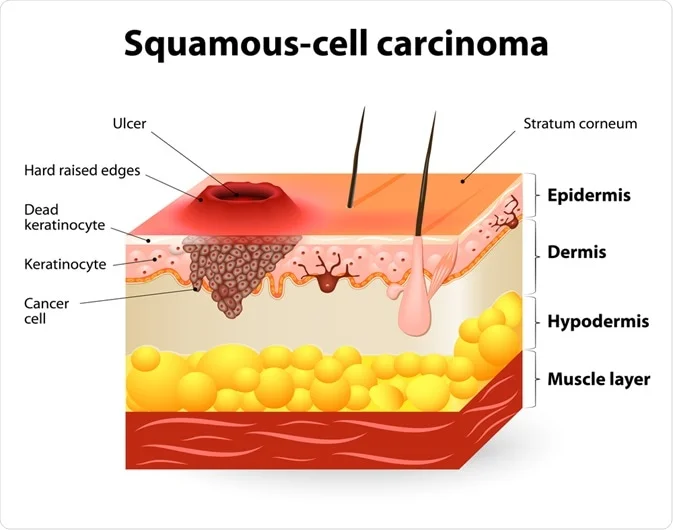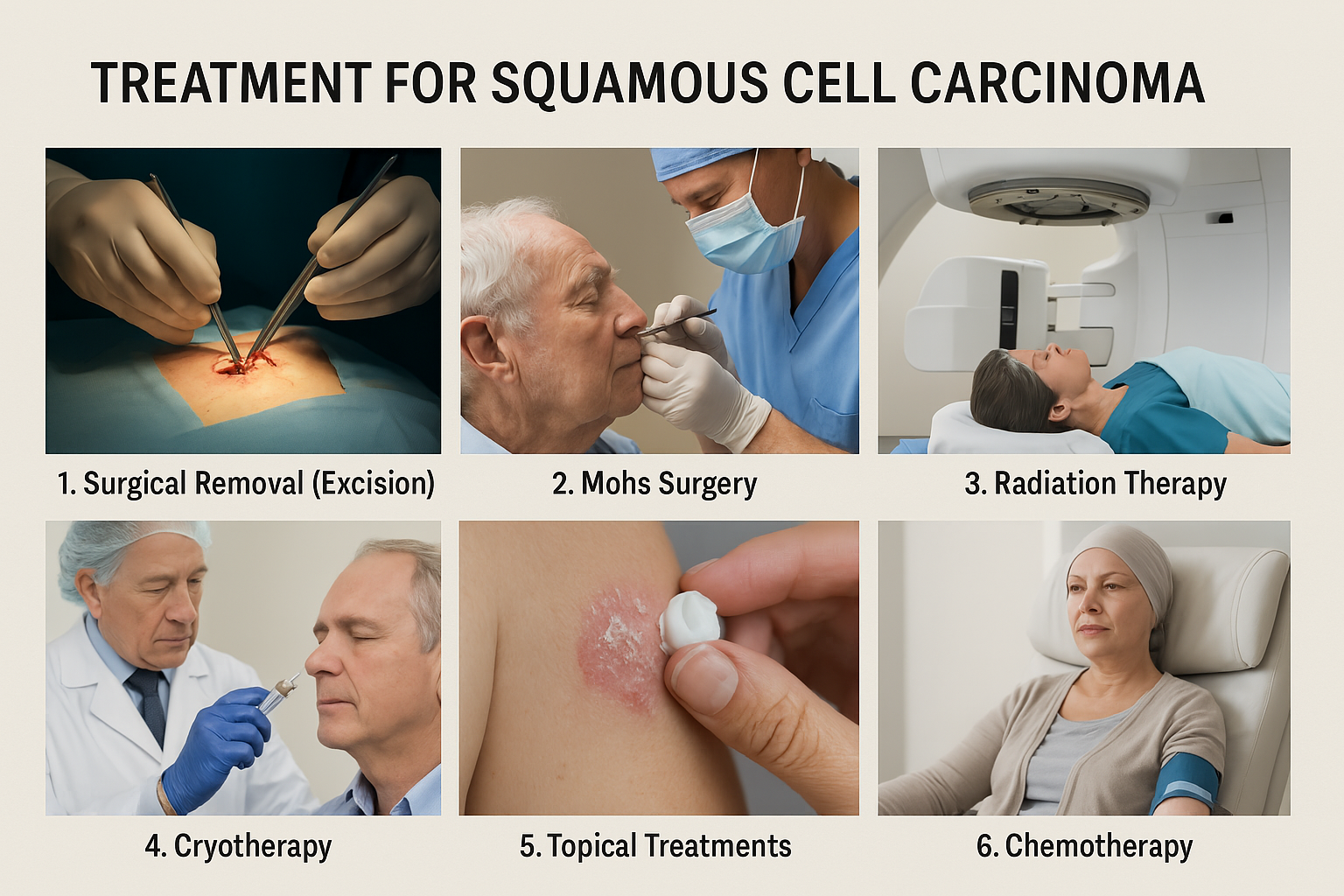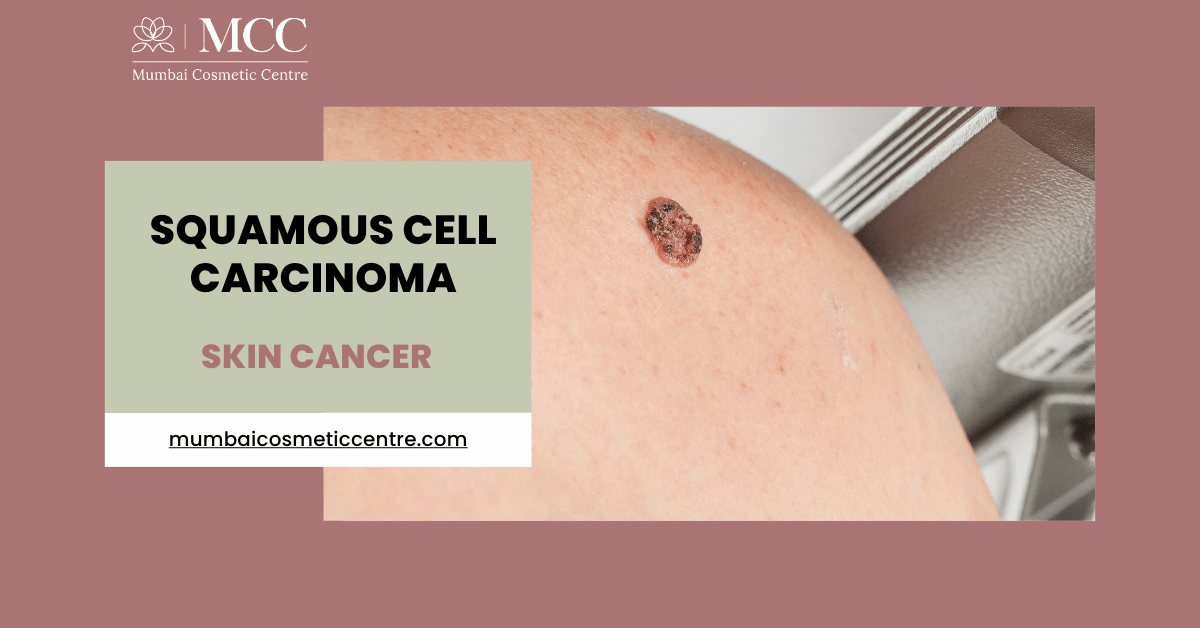Skin cancer is one of the most common types of cancer, and it affects millions of people worldwide. Among the different types of skin cancer, squamous cell carcinoma (SCC) is one of the most prevalent and important to address due to its potential to spread and cause significant health complications. Early detection and proper treatment are crucial in managing this condition effectively. In this blog, we’ll explore the basics of squamous cell carcinoma, its causes and symptoms, available treatment options, and expert recommendations to ensure you understand the condition and know how to take action if needed.
Understanding Squamous Cell Carcinoma

Squamous cell carcinoma (SCC) is a type of skin cancer that originates in the squamous cells, which make up the outermost layer of your skin, known as the epidermis. While SCC is often less aggressive than melanoma, it still has the potential to invade deeper tissues and spread to other parts of the body if left untreated.
SCC commonly develops in areas exposed to the sun, such as the face, ears, neck, chest, backs of hands, arms, or lips. However, it can also occur in areas not typically exposed to the sun. This type of skin cancer typically appears as a scaly, red patch or an open sore that may bleed or crust over.
The key factors that can influence the development of SCC include excessive sun exposure, a history of sunburns, tanning bed use, and a weakened immune system. Although SCC can be a serious condition, it is highly treatable, particularly when diagnosed early.
Causes of Squamous Cell Carcinoma

The primary cause of squamous cell carcinoma is ultraviolet (UV) radiation from the sun or tanning beds. UV radiation damages the DNA in skin cells, causing mutations that can lead to cancer. People with fair skin, light-colored eyes, and a history of frequent sun exposure or sunburns are at a higher risk of developing SCC.
Other risk factors include:
- A weakened immune system: Individuals with conditions such as HIV/AIDS, organ transplant recipients, or those undergoing chemotherapy are more prone to SCC.
- Chronic skin conditions: Certain skin diseases, such as actinic keratosis (AK), a pre-cancerous condition, can increase the likelihood of developing SCC.
- Older age: The risk of SCC increases with age, as UV damage accumulates over time.
- Exposure to chemicals: Certain chemicals like arsenic can increase the risk of skin cancer.
Symptoms of Squamous Cell Carcinoma
The symptoms of SCC vary but generally include:
- A persistent, scaly red patch that may bleed or crust over.
- An open sore that doesn’t heal.
- Raised, wart-like growths or ulcers.
- Crusting or scaling of the skin, sometimes with bleeding.
- A firm, red nodule on the skin that may develop a crust.
In some cases, the cancer can spread to nearby lymph nodes, causing swelling or lumps. If you notice any of these symptoms, it’s crucial to seek medical advice promptly to get a diagnosis and begin treatment if needed.
Treatment Options for Squamous Cell Carcinoma

The treatment for squamous cell carcinoma largely depends on the size, location, and stage of the cancer. Early-stage SCC is usually treated successfully with localized therapies, while more advanced stages may require a combination of treatments. Some of the common treatment options include:
1. Surgical Removal (Excision)
Surgical excision is one of the most common and effective treatments for SCC. The surgeon will remove the cancerous tissue along with a small margin of healthy skin to ensure that all cancer cells are eliminated. This treatment is generally highly effective for small, localized tumors.
2. Mohs Surgery
Mohs micrographic surgery is a specialized technique used for skin cancers in sensitive areas, such as the face or ears. This method involves removing thin layers of the tumor until no cancer cells are detected. It has a high cure rate and minimizes damage to surrounding healthy tissue, making it ideal for SCC on the face and other visible areas.
3. Radiation Therapy
In cases where surgery is not an option or if the SCC is in a difficult location, radiation therapy may be recommended. High-energy rays are used to target and destroy cancer cells. Radiation is often used for tumors that have spread or are recurrent after surgery.
4. Cryotherapy
Cryotherapy involves freezing the cancer cells using liquid nitrogen. This is typically used for small, superficial SCCs and can be an alternative to surgery. It’s a relatively simple procedure with minimal recovery time.
5. Topical Treatments
For very early-stage SCCs, topical treatments like 5-fluorouracil (5-FU) cream or imiquimod cream may be prescribed. These medications are applied directly to the skin and work by stimulating the immune system or inhibiting the growth of cancer cells.
6. Chemotherapy
This may be used for SCC that has spread to other parts of the body (metastasized) or is inoperable. Chemotherapy drugs target rapidly dividing cancer cells and can help shrink tumors or prevent further spread.
Expert Insights and Recommendations
While squamous cell carcinoma is highly treatable, prevention is always the best approach. To reduce the risk of developing SCC:
- Avoid tanning beds and excessive sun exposure, especially between 10 a.m. and 4 p.m. when UV rays are the strongest.
- Wear sunscreen with at least SPF 30, even on cloudy days.
- Wear protective clothing, such as hats and long sleeves, and seek shade when outdoors.
- Get regular skin check-ups, particularly if you have a history of sunburns or have fair skin.
If you notice any changes in your skin, such as new growths, moles, or sores that don’t heal, schedule an appointment with a dermatologist. Early detection of SCC can significantly improve treatment outcomes and prevent complications.
Consultation at Mumbai Cosmetic Centre
At Mumbai Cosmetic Centre, we provide a wide range of transformative beauty treatments, including skin treatments, skin brightening, medifacials, skin PRP, and much more. Led by Dr. Shruti Shah, a pioneer in her field, and Dr. Chetan Shah, an experienced and board-certified anesthesiologist, our clinic offers the latest technologies and treatments to deliver optimal results. Dr. Shruti Shah specializes in non-surgical HIFU vaginal tightening and hymenoplasties, along with conventional gynecological surgeries, while Dr. Chetan Shah’s expertise ensures a safe and comfortable treatment experience.
For consultations, appointments, or more information, visit us at:
Mumbai Cosmetic Centre
1st Floor, Milap Apt, Swami Vivekananda Rd, Opp. Milap PVR Cinemas, Malad West, Mumbai, Maharashtra 400064
+91-7400188399
mccmumbaicosmeticcentre@gmail.com
We offer a comprehensive range of skin treatments, including skin PRP, stretch marks reduction, anti-oxidant repairs, chemical peels, and much more. Book your appointment today and let us help you achieve healthier, more radiant skin!
FAQs
- What is Squamous Cell Carcinoma? Squamous cell carcinoma (SCC) is a type of skin cancer that arises from the squamous cells of the skin’s outermost layer. It can be caused by excessive sun exposure or tanning bed use.
- What are the symptoms of SCC? Symptoms of SCC include scaly red patches, open sores, raised growths, and crusting or bleeding skin.
- How is SCC treated? Treatment options include surgical excision, Mohs surgery, radiation therapy, cryotherapy, and chemotherapy, depending on the stage and location of the cancer.
- Can SCC be prevented? Yes, avoiding excessive sun exposure, wearing sunscreen, and getting regular skin check-ups can help prevent SCC.
- Is SCC curable? SCC is highly treatable, especially when detected early. Surgical excision and other treatments can effectively remove or manage the cancer.
- When should I see a doctor about a skin growth? If you notice any new or changing skin growths, moles, or sores that do not heal, consult a dermatologist as soon as possible for an evaluation.
Conclusion
Squamous cell carcinoma is a treatable skin cancer, especially when detected early. By understanding the symptoms and treatment options, you can take the necessary steps to protect yourself and seek appropriate care. Remember, prevention is key, and regular skin checks can go a long way in identifying potential issues early. If you’re concerned about skin changes or need personalized advice, consult a qualified professional to discuss the best course of action for your skin health.
